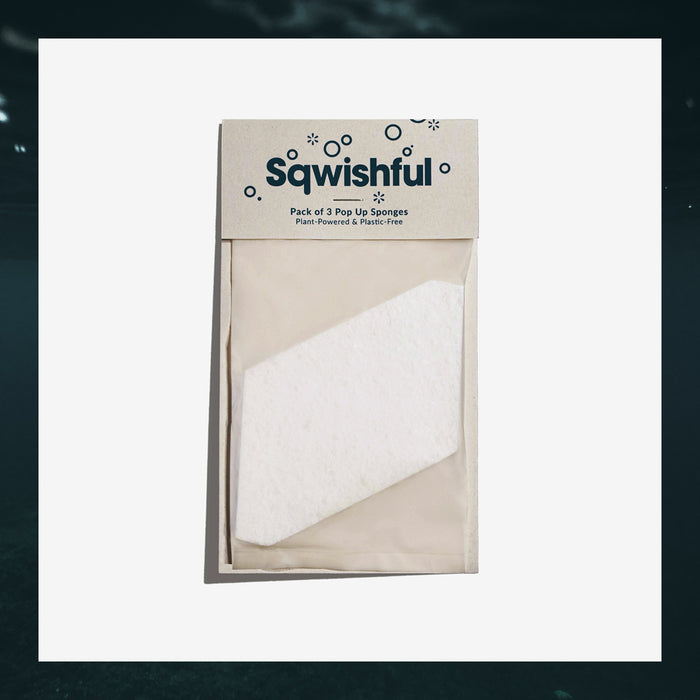With plastic pollution growing every year, innovative solutions are coming to the market — including bioplastics. The use of bioplastics to replace regular plastic is posing many questions amongst consumers. What is bioplastic? Is it truly sustainable? What is it made of?
We’re here to answer your questions and shed light on bioplastics, what they are, and the pros and cons of using them. You’ll also learn about our innovative packaging, made with biodegradable, bio-based plastic. Keep reading to learn more!
What Are Bioplastics?
There is a wide range of bioplastics — some better than others depending on where you live and the availability of recycling or composting programs. A bioplastic usually encompasses two groups: biodegradable plastics and bio-based plastics. One group refers to where the plastic is going (biodegradable) and the other refers to where the plastic is from (bio-based.)
Biodegradable plastics are designed to biodegrade under the right conditions at their end-of-life. Even if they degrade, some biodegradable plastics are petroleum-based. Bio-based plastics are made of plant-based and natural materials — like starches, vegetable oils, chitins, and proteins.

Conventional, biodegradable, and bio-based plastics based on work from Closed Loop Partners
Although most biodegradable and bio-based plastics are plant-based, some of them use corn — a monoculture crop. Many are just as long-lasting as plastic and can end up in landfills and oceans if not disposed of properly.
But not everything is a con — bioplastics have many, great pros too. With only 9% of the world's plastic recycled, biodegradable, bio-based plastics create opportunities for circular economies. Most use less water, and some, are home compostable. ¹
Reducing Our Impact With Biodegradable, Bio-Based Plastic
At Sqwishful, we’re using new innovations to bring you better products with less impact on the environment. That’s why we chose to pack our products with a unique, biodegradable, bio-based plastic — Mater-Bi. This bio-based “plastic” film protects the natural materials in our products from moisture without causing harm to the environment.
The production of Mater-Bi requires 30-80% less energy, which reduces greenhouse gas emissions. The starch-based formulation of this bioplastic is certified biodegradable and compostable at a specialized facility. It also breaks down in a marine environment, if it finds its way there. It leaves no toxic traces when it degrades and it’s made using renewable materials.

Mater-Bi vs. Plastic
These are a few reasons why we chose Mater-Bi as an eco-friendly packaging solution. It's also another way we’re taking further steps to reduce the impact of our products.
Are Bioplastics The Solution to Our Plastic Pollution Problem?
Like most environmental issues, the answer is not black or white. The solution to the plastic pollution problem doesn’t just come from replacing plastic with something else. The linear way of thinking is what got us into this problem in the first place.
Globally, we’re currently producing over 380 million tons of plastic every year. ³ Although biodegradable, bio-based plastics (the non-toxic, compostable kind) are a great first step to minimizing plastic waste, they’re not the solution. A huge global effort must be put into recycling and disposing of plastic waste correctly — while adopting principles of circularity.

Plastic vs. Bioplastic, photo of plastic recycling by Polina Tankilevitch
For bioplastics to have a greater positive impact, a better waste management system is needed. The lack of education on how to properly dispose of bioplastics causes them to get mixed up in recycling streams. When bioplastics and regular plastics get mixed up, the regular plastics are no longer recyclable and the whole lot ends up in landfills or incinerators.
We need better disposal, recycling, and reusing systems that create circular economies and lead to less plastic production. With more circular systems, biodegradable, bio-based plastics have the potential to not only reduce the impact plastic is having on the environment but also help us tackle other areas like carbon capture and food waste.
Why is Tackling Plastic Pollution Important?
We have a clear mission at Sqwishful — to help you clean and leave the world cleaner. But this doesn’t only have to do with natural spaces. It also has to do with keeping vulnerable communities clean from plastic pollution and other threats.
In the United States, 79% of plastic incinerators are placed in Black and Hispanic neighborhoods. Plastic production facilities also target communities of POC. This increases rates of asthma and heart disease and pollutes their air, water, and soil.

When we say “leave the world cleaner” we mean our natural spaces and oceans should be clean and free of pollution. But we also mean healthy communities with access to clean air, water, and soil in all parts of the world.
Our Mission to Leave The World Cleaner is Always Improving
Our commitment to you and the environment never ends. We’re excited to use innovative tree-free, plastic-free, and compostable packaging for our products. But this doesn’t mean our work is done.
We’re still looking for innovative ways to bring you better products with less impact on the environment. Our next target: home compostable packaging. At the moment, we haven't found home-compostable packaging that withstands the shipping environment without disintegrating. But when we do — you’ll see it in our products.
Our commitment to clean and leave the world cleaner pushes us to keep trying new things, improving, and relying on innovation. We're proud of the work we do and hope you enjoy our products that leave your home and the world squeaky clean.

Sqwishful is the winner of Treehugger's Best of Green Cleaning Award 2021
If you want to learn more about composting and how to properly dispose of your waste, read this.
Are you on a mission to leave the world cleaner? Our zero-waste, compostable cleaning products are the way to start. Shop our eco-conscious collection here.
Sources
1. EarthEasy, Bioplastics: Are They Really Better?
2. Mater-Bi, Bioplastics and Crops: a False Problem.
3. Our World in Data, Plastic Pollution
